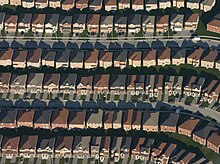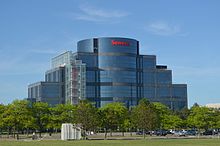Markham (Ontario)
| Markham | ||
|---|---|---|
 Markham Civic Center |
||
| Motto : Leading While Remembering | ||
| Location in Ontario | ||
|
|
||
| State : |
|
|
| Province : | Ontario | |
| Regional Municipality : | York | |
| Coordinates : | 43 ° 53 ′ N , 79 ° 15 ′ W | |
| Height : | 200 m | |
| Area : | 212.58 km² | |
| Residents : | 301,709 (as of 2011) | |
| Population density : | 1,419.3 inhabitants / km² | |
| Time zone : | Eastern Time ( UTC − 5 ) | |
| Postal code : | L3P - L6G | |
| Foundation : | 1794 | |
| Mayor : | Frank Scarpitti | |
| Website : | www.markham.ca | |
Markham [ mɑɹkəm ] is a city in the Regional Municipality of York , north of the city Toronto ( Canada ). Markham is Canada's largest urban association and part of the Greater Toronto Area . In 1793 Markham was classified as a settlement area, then first settled in 1794 and merged into the city association in 1972. Markham is the twin town of the German Nördlingen .
Markham includes: Markham Village, Cornell, Unionville, Milliken, Thornhill and other localities. While the city has historically been considered a suburb of Toronto, the local economy has become independent quite quickly. Many high tech companies have chosen Markham as their location because of the large amount of land available, low taxes and good infrastructure . For example, ATI , IBM Canada , Apple and many other well-known companies selected Markham as their head office for Canada. Therefore, the city today likes to call itself the “high-tech capital” of Canada.
geography
Markham is bordered to the west by Richmond Hill and Vaughan , to the north by Whitchurch-Stouffville , to the east by Pickering and to the south by Toronto .
Parts of the Rouge National Urban Park lie in the western part of the city .
history
When Upper and Lower Canada were formed in 1791 , John Graves Simcoe was named Vice- Governor of Upper Canada. Simcoe named the Markham settlement in the north of the city of York (now Toronto) after his friend William Markham , the Archbishop of York .
In 1794, William Berczy brought 75 families of German descent from New York State to Markham, each granted 200 acres of land. But because of the hardship of life there, many returned to what was then York or Niagara . In 1797, before the French Revolution, large parts of the French nobility fled to Canada to take advantage of Upper Canada's offer of free land. However, they were completely unprepared to survive under such harsh conditions that most of them returned to their old homeland a short time later.
From 1803 to 1812 the largest groups of new settlers were Germans from Pennsylvania ; most of them were Mennonites . These skilled artisans and farmers had the best chance of surviving there, as they had already had to survive in harsh conditions in Pennsylvania. From 1830 onwards, many Irish , Scottish and English emigrants came to Upper Canada to escape the famine and overpopulation of their home countries.
The first form of structured city government came into being in 1850 with the establishment of the Parish of Markham. On November 20, 1872, the York County administrator signed an auxiliary law establishing the election of a Markham ward council. By 1891, Markham's village population had grown to 1,100.
Beginning in 1945, Markham quickly and profoundly changed its face: it was no longer a parish with residents working in the area. It developed into a rapidly growing suburb from which a majority of residents commuted to Toronto for work . The rural setting of Markham fell victim to rapid urban growth.
In 1969 the parish of Markham consisted of several villages, including Markham, Unionville and parts of what is now Thornhill. In 1971 the Regional Municipality of York was established. As part of this change, parts of northern Markham became part of Richmond Hill Ward, while Markham Ward was granted town charter and the current boundaries were established.
In 1976 Markham had a population of 56,000. In 2011 the city reached a little over 300,000 inhabitants. In these 35 years the population has increased more than fivefold.
Economy and Infrastructure
economy
Markham developed into a high-tech location. Large companies in the IT and electronics industry have a location in the city. These include IBM Canada , Motorola , Toshiba, Lucent, Apple and ST Microelectronics (Genesis Microchip) and AMD . Other companies are TD Waterhouse, American Express Canada. Another major automotive company headquartered in the city is Honda Canada . Markham has several large shopping centers with more than 100 stores. These include the Market Village with 170 shops, the Markville Shopping Center with 250 shops, the Pacific Mall with 450 mini-shops and the mall on South Unionville Square with 300 shops.
traffic
Markham has a regional airport, Buttonville Airport .
education
Markham has several public schools that run through grade 12 (high school). These include:
- Bill Crothers Secondary School
- Bur Oak Secondary School
- Markham District High School
- Markville Secondary School
- Middlefield Collegiate Institute
- Milliken Mills High School
- Pierre Elliott Trudeau High School
- Thornhill Secondary School
- Thornlea Secondary School
- Unionville High School
The only college that operates a campus in the city is the Seneca College of Applied Arts and Technology . Around 20,000 full-time students and 75,000 part-time students study at the university. In the vicinity of Markham there are other universities such as the Scarborough Campus of the University of Toronto , North York Campus of York University , and the Oshawa Campus of the University of Ontario Institute of Technology .
politics
The Mayor of Markham is Frank Scarpitti. The city council consists of the mayor, four regional councils and eight city councils, who represent the city's eight electoral districts. The mayor and regional councils are elected nationwide to represent the city of Markham.
Although the city councils are also remunerated for their services by the city administration, in many city districts the councils fulfill their mandate in addition to their actual work in another profession.
The city council elections take place every three years and the councils are accordingly elected for a three-year legislative period .
statistical data
Status: 2001
| Average age: | 37.2 years (men: 36.2, women: 38.1) |
| Number of private apartments: | 61,618 |
| The average income of households : | $ 77,163 (CAD) corresponds to approx. € 50,572 ( exchange rate as of February 9, 2007) |
Culture
Markham has a large proportion of the population of Chinese descent.
Town twinning
-
 Cary (North Carolina) , USA
Cary (North Carolina) , USA
-
 Las Piñas , Philippines
Las Piñas , Philippines
-
 Nordlingen , Germany
Nordlingen , Germany
-
 Pearland, Texas , USA
Pearland, Texas , USA
-
 Wuhan , China
Wuhan , China
sons and daughters of the town
- Chris Bahen (* 1980), Canadian ice hockey player
- Kevin Schmidt (* 1986), German-Canadian ice hockey player
- Daniel Morad (* 1990), Canadian racing driver
- Steven Stamkos (* 1990), Canadian ice hockey player of Macedonian-Scottish descent
- Jeff Skinner (* 1992), Canadian ice hockey player
- Tanner Richard (* 1993), Swiss-Canadian ice hockey player
- Joseph Blandisi (* 1994), Canadian ice hockey player
- Warren Foegele (* 1996), Canadian ice hockey player
- Mitchell Marner (born 1997), Canadian ice hockey player


